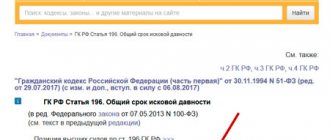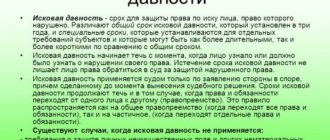Car owners who have old transport tax debts should keep in mind that there is a statute of limitations for this type of payment. This means that tax authorities not always entitled demand repayment of such debts.
This review material will help you understand what the statute of limitations for holding people accountable for non-payment of taxes is and how it differs from the statute of limitations, as well as when a citizen may no longer pay anything to the state.
Statute of limitations for bringing to justice for non-payment of transport tax
All time periods during which payment must be made are established at the legislative level. In 2021, the limitation period for transport tax for violations of its payment is regulated by Part 1 of Art. 113 Tax Code of the Russian Federation . 3 years have passed from the next day after the end of the tax period or from the day the tax payment violation was committed , then the person who committed the tax violation cannot be held accountable.
Paragraph 1 tsp. 1 tbsp. 113 Tax Code of the Russian Federation
A person cannot be held accountable for committing a tax offense if three years have elapsed from the date of its commission or from the next day after the end of the tax (calculation) period during which this offense was committed and before the decision on bringing to responsibility is made ( statute of limitations).
Thus, the statute of limitations for tax evasion is 3 years . In case of non-payment of transport tax by a legal entity, the three-year period is counted from the next day after the end of the tax period, that is, the year for which the tax was not paid.
Individuals, unlike organizations, do not calculate the amount of tax themselves; the Federal Tax Service does this for them, sending the results of calculations in a tax notice. According to Part 3 of Art. 363 of the Tax Code of the Russian Federation, the notification cannot indicate the amount of tax for more than 3 years preceding the current one. And an individual, in turn, is not obliged to pay debts that were incurred during tax periods earlier than these 3 years.
Clause 3 Art. 363 Tax Code of the Russian Federation
Sending a tax notice is allowed no more than three tax periods preceding the calendar year of its sending.
Taxpayers specified in paragraph one of this paragraph pay tax for no more than three tax periods preceding the calendar year of sending the tax notice specified in paragraph two of this paragraph.
This means that the tax notice you receive in 2021 may only show debts for the previous 3 years, and you are not required to pay taxes accrued before this period .
Tax notice
As a general rule, individuals independently calculate how much they need to deposit. No notifications from the tax service are sent to the subscriber's address. As for organizations, every year an official letter is sent to legal entities with a full calculation of the amount that should be deposited into the Federal Tax Service account at the designated time.
In addition, you can independently familiarize yourself with the upcoming payment amount in the following ways:
- in person at the territorial office of the Federal Tax Service;
- on the State Services website;
- on the official website of the Federal Tax Service.
If the subscriber begins to accumulate debt, then the tax office can and should send a notification to the person’s account about the need to repay the debt amount.
The notice may not contain reference to periods exceeding three calendar years.
If the tax service cannot independently force (convince) a person to repay the debt, then the court comes into action. The Federal Tax Service is preparing a statement of claim demanding to forcibly deduct a person’s debt, but not more than for three years preceding the date of filing the claim.
What is the statute of limitations and when does it expire?
Do not confuse the statute of limitations for holding people accountable for tax offenses, which we discussed above, and the statute of limitations. The statute of limitations is the period during which the Federal Tax Service has the right to go to court to collect tax debts from the debtor.
To physical persons paid taxes on time and did not accumulate debts, the tax service authority:
- Sends a tax notice no later than 30 days before the end of the payment period ( Part 2 of Article 52 of the Tax Code of the Russian Federation ) indicating the tax amount.
- Sends to the taxpayer tax claim, which indicates the amount to be paid and penalties if payment was not made on time.
If the taxpayer does not pay the debt after receiving the demand, the tax office has the right to sue him, and it is obliged to do this within a certain time frame. The limitation period for transport tax depends on the date of receipt of the demand for payment of the debt and its total amount. Upon completion of this period, the tax office loses the right to demand payment of the debt. The general limitation period is three years. Unless otherwise established by law, the limitation period begins from the day when the person learned or should have learned about the violation of his right and who is the proper defendant in the claim for the protection of this right ( Articles 196, 200 of the Civil Code of the Russian Federation ).
Let's look at each stage in more detail.
Possible period of TN reimbursement
If we are talking about the return or offset of overpaid amounts, then the statute of limitations for them is determined on the general basis described in Art. 78 Tax Code: no more than 3 years must pass from the date of payment. After reconciliation, the overpayment can be used in several ways :
- reserve to pay off future obligations;
- return to the sender's account;
- offset against payment of other taxes, fines or penalties.
Conditions for return
Before exercising the right to reimburse overpaid funds, you need to make sure that the mandatory conditions for completing the transaction are met:
- the taxpayer reported himself or received a notification from the inspector about the discovery of the surplus;
- the amount of the overpayment has been agreed upon (for this purpose a documentary reconciliation is carried out);
- no more than 3 years have passed from the date of payment.
If a person has arrears on other types of taxes and fees, then a refund is possible only after the debts are repaid.
Return application and documents
To get a refund of excessively transferred amounts of transport tax, you must contact in writing the Federal Tax Service Inspectorate to which the payer belongs in accordance with his place of registration. The application form was approved by Order of the Federal Tax Service No. ММВ-7-8/ [email protected] of 2018 :
- return – Appendix 1;
- test – Appendix 2.
The regulation does not require supplementing the paper with any copies, however, when conducting a reconciliation, you may need to provide payment receipts or documents for the vehicle.
Request for payment of transport tax
According to Part 1 of Art. 363 Tax Code of the Russian Federation physical. persons are required to pay transport tax after receiving a notification before December 1 of the year following the tax period (for example, the tax for 2021 must be paid before 12/01/18 ). If you do not pay the tax within this period, then the penalty will begin to accrue from the next day of delay. The tax office, having discovered non-payment of tax, sends a demand for payment of the debt within:
- 3 months (for debts over 500 rubles);
- 1 year (less than 500 rub.)
Clause 1 Art. 70 Tax Code of the Russian Federation
The requirement to pay the tax must be sent to the taxpayer (responsible participant in the consolidated group of taxpayers) no later than three months from the date of detection of the arrears, unless otherwise provided by this article. If the amount of arrears and debt on penalties and fines related to this arrears is less than 500 rubles, the demand for tax payment must be sent to the taxpayer no later than one year from the date of discovery of the arrears, unless otherwise provided by paragraph 2 of this article.
Having received such a request, you must pay the full amount of the debt within 8 days , unless a different deadline is specified in the document.
Paragraph 4 p. 4 art. 69 Tax Code of the Russian Federation
The demand for payment of tax must be fulfilled within eight days from the date of receipt of the specified demand, unless a longer period of time for paying the tax is specified in this demand.
Please note : The deadline for receiving transport tax notices is November 1 . If the letter from the tax office never arrived, this does not mean that you are exempt from paying tax on your car. In this case, you should contact the Federal Tax Service and receive a notification yourself.
Exclusion of the taxpayer's guilt in non-payment of tax
Tax legislation, namely Article 111 of the Tax Code of the Russian Federation, provides for circumstances that justify non-payment of transport tax by taxpayers. Thanks to these circumstances, the taxpayer’s guilt in relation to a tax offense is completely excluded. Such circumstances include:
- natural disasters or other force majeure circumstances;
- the taxpayer’s condition, characterized by the inability to be aware of his actions due to illness;
- incorrect indication of the deadlines for payment of transport tax in official documents received from the tax authorities;
- other circumstances recognized in court as circumstances excluding the taxpayer’s guilt.
In the presence of these circumstances, the taxpayer is not liable for committing a tax offense.
When does the tax office submit an application to the court for payment of transport tax?
If an individual taxpayer ignores the requirement that we discussed above, then the tax office goes to court. In this case, the debt will be repaid at the expense of the property, including funds, of the debtor in accordance with paragraph. 1 clause 1 art. 48 Tax Code of the Russian Federation .
The tax authority sends the application to the court within the following time limits:
- If the debt exceeds RUB 3,000 . - within 6 months from the date of expiration of the tax payment requirement (counted from the 9th day after receipt of the tax requirement).
The specified collection application is submitted by the tax authority (customs authority) to the court if the total amount of tax, fee, insurance premiums, penalties, fines to be recovered from an individual exceeds 3,000 rubles, except for the case provided for in paragraph three of paragraph 2 of this article ( paragraph 4, paragraph 1, article 48 of the Tax Code of the Russian Federation ).
- If the debt for 3 years after the delay in fulfilling the first requirement exceeded 3,000 rubles . - within 6 months from the date when the debt reached 3,000 rubles .
If, within three years from the date of expiration of the earliest requirement for payment of tax, fee, insurance premiums, penalties, fines, taken into account by the tax authority (customs authority) when calculating the total amount of tax, fee, insurance premiums, penalties, fines to be collected from an individual, such amount of taxes, fees, insurance premiums, penalties, fines exceeded 3,000 rubles , the tax authority (customs authority) applies to the court with an application for recovery within six months from the day when the specified amount exceeded 3,000 rubles ( paragraph 2 clause 2 article 48 of the Tax Code of the Russian Federation ).
- If the debt within 3 years after the expiration date of the first requirement does not exceed 3,000 rubles . - within 6 months upon completion of 3 years.
If, within three years from the date of expiration of the earliest requirement for payment of tax, fee, insurance premiums, penalties, fines, taken into account by the tax authority (customs authority) when calculating the total amount of tax, fee, insurance premiums, penalties, fines to be collected from an individual, such amount of taxes, fees, insurance premiums, penalties, fines does not exceed 3,000 rubles , the tax authority (customs authority) applies to the court with an application for collection within six months from the date of expiration of the specified three-year period ( paragraph 3, paragraph. 2 Article 48 of the Tax Code of the Russian Federation ).
Features of receipt and payment of notifications by taxpayers
According to the law, individuals contribute funds for transport tax using ready-made calculations from tax authorities recorded in the tax notice. In this case, a situation is possible when the taxpayer receives a notice requiring him to pay tax for the current period and the period four years ago. In this situation, it is quite acceptable to pay the TN only for the current year.
Receiving a notification for a period that passed several years ago may be explained by a failure in the tax service system. It is possible that the taxpayer contributed funds in good faith, but the program did not take this into account. To avoid conflict situations, it is recommended to save all proof of tax payment. Such a precaution will allow an individual to prove his case in the event of litigation.
According to official requirements, after the statute of limitations for transport tax has expired, representatives of authorities do not have the right to demand payment of debts. However, the court has the right to issue an order for collection after the expiration of the period. After receiving the document drawn up for debt collection, the tax office must transfer it to the bailiffs within three years.
Thus, bailiffs begin work to collect funds from the debtor upon timely notification. If the authority was notified after three years from the date of the tax offense, restoration of the right to collect taxes can only be achieved if there are compelling reasons.
Most disputes in this process are based on determining the date of delay and who exactly is responsible for the debt. On these grounds, many legal disputes between tax subjects unfold.
Results
Aggressive conflicts with tax authorities rarely end well for the taxpayer. Citizens should resolve disputes that arise based on the provisions of the law peacefully.
It is worth remembering two basic rules relating to the payment of transport tax:
- The Tax Code of the Russian Federation regulates: the limitation period for TN is 6 months from the date of sending the notice to the car owner. The tax office has the right to file a lawsuit to recover funds only during this period.
- You can only request payment for the last three years. For previous periods, the tax service cannot demand payments under the Taxpayer Invoice.
Despite the presence of provisions in the legislation that alleviate the situation of the taxpayer, citizens should not count on them. Debt write-off is a rare occurrence in Russia. If necessary, tax authorities will be able to restore the statute of limitations and recover the amount of debt from the car owner.
Resolution of controversial issues
Tax authorities often make mistakes that allow a motorist to legally not pay the tax until the circumstances are clarified.
Such controversial situations include the following cases:
- incorrect calculation of the amount of transport tax;
- receipt by an individual of a previously paid tax notice;
- sending a receipt after the statute of limitations has expired (after three years).
Due to such errors, the Federal Tax Service does not have the right to demand that a person pay tax. However, there are other controversial issues that are fraught with consequences for the taxpayer.
Thus, the debtor may face the following negative sanctions:
- ban on travel outside the Russian Federation;
- imposition of administrative arrest;
- evacuation of the vehicle and its subsequent sale (the proceeds will be used to pay off the citizen’s debts);
- automatic withdrawal of the debt amount from a bank deposit.
If government officials consider a citizen guilty, but the taxpayer himself is confident that he is right, he must begin to protect his rights. To do this, an individual must contact the prosecutor's office or a judicial authority.
It is important to know: in case of evasion from depositing funds established by law, a criminal case will be opened against a citizen on the basis of Articles 198 and 199 of the Criminal Code of the Russian Federation.
A notification has been received for the past tax period
As an example, it is worth examining the procedure for a taxpayer’s actions in a specific controversial situation. For example, the owner of a car received a receipt for the current year 2021 with information about the need to pay the debt for 2021. At the same time, the demand for payment of the debt was sent to the FSSP in accordance with the relevant decision of the judicial authority.
A citizen has the right to appeal the received document, citing the fact that he was not aware of the existence of a debt. This justification may well be considered significant if the individual has not previously received any notifications about payment of TN for a given year.
The most competent solution in this case would be to pay the tax receipt before the start of the proceedings. This measure will protect the citizen from penalties in case of loss. If the demand turns out to be unlawful, the deposited funds will be returned to the motorist.
Repeated notification of paid transport tax
If the driver receives a secondary request to deposit funds under the Taxpayer Tax Code or to pay a debt (provided that the taxpayer fulfilled his obligations in good faith and cannot have any debts), it is necessary to prove that the person is right.
As evidence of the unlawfulness of the claim, the motorist must present saved receipts or receipts. These papers must be provided to the Federal Tax Service or FSSP.
The notification comes to the sold car
In some situations, a receipt for payment of transport tax on a sold car is received legally. If the notice notifies the person of the need to make a payment only for the period of use, the citizen must make the payment.
The need to take action arises when a tax notice is received for a car that was sold more than 12 months ago. In this situation, the taxpayer must contact the tax office and provide documents confirming the purchase and sale of the car.
It is also unlawful to charge tax without taking into account the fact of sale of the vehicle (that is, for the full tax period if the person owned the car for only half of the year). To challenge this decision, you must submit an application for recalculation of the amount of tax for owning a vehicle.









